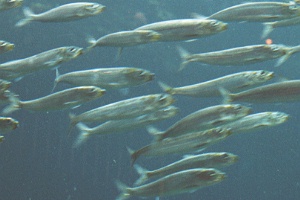Forage fish
Forage fish are small, schooling fish that serve as a crucial food source for larger predatory fish and other marine animals. These fish play a vital role in the marine food web, acting as a bridge between the lower and higher trophic levels. Forage fish are typically rich in oils and nutrients, making them an essential component of the diets of many marine species, including seabirds, marine mammals, and larger fish.
Characteristics[edit | edit source]
Forage fish are generally small, pelagic fish that form large schools. They are often found in the epipelagic zone of the ocean, where they feed on plankton and other small organisms. Common examples of forage fish include anchovies, sardines, herring, and menhaden. These species are known for their rapid reproduction and growth rates, which help sustain their populations despite heavy predation.
Ecological Role[edit | edit source]
Forage fish occupy a critical position in the marine ecosystem. They consume phytoplankton and zooplankton, converting these primary producers into a form of energy that is accessible to higher trophic levels. This process is essential for the transfer of energy up the food chain. The abundance and health of forage fish populations can significantly impact the populations of their predators, including commercially important fish species such as tuna, salmon, and cod.
Economic Importance[edit | edit source]
Forage fish are not only ecologically important but also economically valuable. They are harvested in large quantities for use in fishmeal and fish oil, which are key ingredients in aquaculture and livestock feed. Additionally, some forage fish species are consumed directly by humans, particularly in regions where they are abundant.
Conservation and Management[edit | edit source]
The management of forage fish populations is crucial to maintaining the balance of marine ecosystems. Overfishing of these species can lead to declines in predator populations and disrupt the entire food web. Sustainable fishing practices and effective management policies are necessary to ensure the long-term health of forage fish stocks and the ecosystems they support.
Related Pages[edit | edit source]
Search WikiMD
Ad.Tired of being Overweight? Try W8MD's physician weight loss program.
Semaglutide (Ozempic / Wegovy and Tirzepatide (Mounjaro / Zepbound) available.
Advertise on WikiMD
|
WikiMD's Wellness Encyclopedia |
| Let Food Be Thy Medicine Medicine Thy Food - Hippocrates |
Translate this page: - East Asian
中文,
日本,
한국어,
South Asian
हिन्दी,
தமிழ்,
తెలుగు,
Urdu,
ಕನ್ನಡ,
Southeast Asian
Indonesian,
Vietnamese,
Thai,
မြန်မာဘာသာ,
বাংলা
European
español,
Deutsch,
français,
Greek,
português do Brasil,
polski,
română,
русский,
Nederlands,
norsk,
svenska,
suomi,
Italian
Middle Eastern & African
عربى,
Turkish,
Persian,
Hebrew,
Afrikaans,
isiZulu,
Kiswahili,
Other
Bulgarian,
Hungarian,
Czech,
Swedish,
മലയാളം,
मराठी,
ਪੰਜਾਬੀ,
ગુજરાતી,
Portuguese,
Ukrainian
Medical Disclaimer: WikiMD is not a substitute for professional medical advice. The information on WikiMD is provided as an information resource only, may be incorrect, outdated or misleading, and is not to be used or relied on for any diagnostic or treatment purposes. Please consult your health care provider before making any healthcare decisions or for guidance about a specific medical condition. WikiMD expressly disclaims responsibility, and shall have no liability, for any damages, loss, injury, or liability whatsoever suffered as a result of your reliance on the information contained in this site. By visiting this site you agree to the foregoing terms and conditions, which may from time to time be changed or supplemented by WikiMD. If you do not agree to the foregoing terms and conditions, you should not enter or use this site. See full disclaimer.
Credits:Most images are courtesy of Wikimedia commons, and templates, categories Wikipedia, licensed under CC BY SA or similar.
Contributors: Prab R. Tumpati, MD




